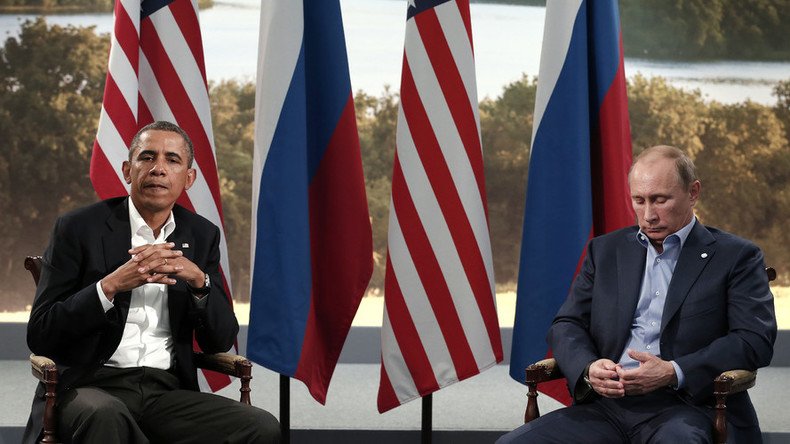Lame duck Obama throws in the towel on Russia

The last time relations between Washington and Moscow were this lousy, Madonna and Wham! were top of the charts and Soviet leaders were dying at an alarming rate. Foreign policy has emulated 1985's most famous movie and gone Back To The Future.
Barack Obama doesn't understand Russia. This became completely obvious when he delivered probably the most poorly judged insult any American President has ever uttered toward Moscow, dismissing the country as a “regional power.”
Now, you might think Ronald Reagan was pretty rude when he called the USSR an “evil empire.” And it's doubtlessly true that many Russians - and Ukrainians, Latvians and Georgians etc. at the time - were upset by the “evil” segment, but at least he balanced his insult by referring to Moscow’s realm as an “empire.” You see empires, no matter how nefarious, are strong, but “regional powers” are weak.
Thus, Obama using these two words was a colossal error of judgment. Especially when you consider how he was taunting the only country on earth which is capable of inflicting real military damage on America. For the record, he added how he perceived Russia to be acting “not out of strength, but out of weakness.” Presumably, just to double down on the affront.
In the same way most Brits are proud of their Royal Family, the French are haughty about their food and Japanese puffed up by industrial might, Russians are appreciative of their country’s power. If Obama had received proper advice on how to handle Moscow he’d never have made such a calamitous boo-boo.
Especially when his statement was completely untrue, as subsequent Middle East events have demonstrated. That said, however, the hapless performance of his former Ambassador to Moscow, Michael McFaul, suggests he hired badly on the Russian front.
Farewell to dialogue
Now, with only a few months left in his Presidency, it appears Obama has finally given up on Moscow - which seems to be an acceptance of how his Russia policy has gone up in smoke. As a result, the outgoing President will - almost certainly - be handing his successor two completely unresolved conflicts as the aperitif for their time in office. Those in Syria and Ukraine.
If Obama wanted to avoid this situation, and thereby achieve a more credible legacy, there are myriad things he could still do. For instance, he might request a summit with Vladimir Putin to finally reach agreement on both matters. And this, of course, is what previous occupants of the White House did when relations went sour. Or he could even go further by calling full-scale conferences on both, inviting all the stakeholders (although you'd need an aircraft carrier to host all the contributors to the Syrian strife). But it appears Obama is too jaded to attempt to leave behind a clean record. He’d rather play golf and let poor John Kerry do all the donkey work.
Right now, relations between Moscow and Washington are at their lowest ebb since Konstantin Chernenko and Reagan occupied the two hot seats. And it’s worth noting how the former died in 1985. So, now that I’ve highlighted the extent of the malaise, it’s time to explain how bilateral engagement became so atrocious.
Self-regard
Obama evidently has an enormous ego. And his arrogance toward Russia proves it. He’s assailed its economy, mocked Putin and completely refused to recognize Russian concerns in Eastern Europe. Furthermore, he’s even using Putin as a truncheon to batter Republican candidate Donald Trump in the current domestic election campaign. This is bad diplomacy, at the very least.
Here’s a sample Obama quote: “Russia is isolated, with its economy in tatters.”
This was in January 2015 and it’s a new variant of a theme that’s been doing the rounds since 1999. Back then Anders Aslund - now a lobbyist at NATO’s Atlantic Council adjunct - predicted the country’s imminent collapse in a ‘Foreign Policy’ article which has become seminal. As an example of how to be spectacularly wrong on Russia, that is. Aslund, who gets away with his shtick to this day, is a prime example of somebody completely clueless on Russia who, bizarrely, is able to influence US policy makers. And I reckon it’s this sort of below par advice which explains why the Obama administration - and the Bush government before it - has been consistently wrong-footed on the “Russian question.”
In Moscow, there are a number of theories doing the rounds to explain why Obama has apparently thrown in the towel. Russian Foreign Minister Sergey Lavrov seems to believe the US President is not fully in control of his military and other elements in his government.
Meanwhile, the Russian Foreign Ministry’s spokesperson, Maria Zakharova has said Washington simply has no unified stance.
Multi-party mess
The reasons for this are maybe less complicated than they seem. If it can be put remotely simply, both Washington and Moscow oppose ISIS. However, America’s allies Saudi Arabia and Qatar are ISIS’s main supporters, which make things complicated.
The US views Islamist rebels (referred to as ‘moderates’ in the Western media) as the country’s future while Russia regards them as terrorists. For its part, the White House believes the real aggressor is the Syrian government. Which Russia contends is the only entity capable of keeping the state intact - and defeating ISIS. There are also myriad other vested interests to take into account, including Turkey, Iran, Israel, the Kurds and various others. But let’s not go there.
We also can’t forget Ukraine, where things are a bit simpler. Post Brexit and the Dutch referendum, there is no hope of Ukraine ever joining the EU. Thus, aside from wanting the conflict contained, Germany, France and the UK have stepped back. Even Sweden and Poland, who under previous regimes pushed for EU expansion eastwards, have disengaged. As a result, it's now a straight conversation between Washington and Moscow. The US desires a foothold in Kiev and Russia wants them out. Obama’s replacement will have to decide whether to up the ante or concede the issue. It’s also possible that internal Ukrainian concerns could intervene to change the dynamics.
After the State Department announced this week that it was suspending talks with Russia on Syria, the Kremlin saw the move and raised the stakes. President Putin introduced a bill to the State Duma which proposes suspending a plutonium disposal agreement with the US, citing “unfriendly actions” by Washington. In order to renew the deal, Moscow is seeking the cancellation of sanctions and the removal of US military installations from certain east European countries.
Perhaps Putin was responding to some very careless words by State’s spokesman, John Kirby? The official spoke of “new sanctions,” “terror attacks on Russia soil,” “troops in body bags” and “lost aircraft.”
US words on ‘attacks in Russia, body bags, downing jets’ sound like “get ’em” call - Russian FM spox https://t.co/r57MiSIDH2
— RT (@RT_com) September 29, 2016
Whatever the reason, it’s clear Obama has given up on Putin and the Kremlin has replied by washing its hands of his administration. The result is that for the next few months, the planet’s two military superpowers won’t be on speaking terms. With Syria and Ukraine essentially proxy conflicts between the pair, this is not good. Not to mention urgent issues like climate change, migration and the condition of the global economy, which require cooperation between all the world's strongest nations.
The statements, views and opinions expressed in this column are solely those of the author and do not necessarily represent those of RT.















